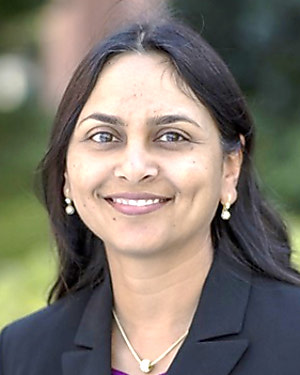Research Summary
Dr. Sharma’s laboratory focuses on elucidating the molecular mechanisms underlying breast cancer initiation and progression and developing various preventive and treatment strategies using mouse models and human samples. Areas of specific interest include understanding the molecular connections between breast cancer and obesity, racial disparities, and microbial dysbiosis. Obesity is an important risk factor for breast cancer—a 5-unit increase in BMI is associated with a 12 percent increase in breast cancer risk. In the United States, about 36 percent of adults are obese, and the prevalence is increasing globally. We are uncovering new pathways as well as developing strategies to abrogate obesity-breast cancer axis and improving therapeutic response in obese women. Racial disparity in breast cancer is clearly evident in triple negative breast cancer (TNBC) with younger African American women exhibiting a disproportionately higher burden of TNBC, an aggressive subtype of breast cancer. The Sharma lab is working to understand the molecular wiring and examining novel drug combinations for African American women with TNBC. Microbial eubiosis and dysbiosis are of growing interest as we now appreciate that the number of microbial cells living within and on human body is roughly equal to the total number of human cells. While eubiosis is associated with normal functioning of the body, dysbiosis can impact disease progression as well as response to therapy. The Sharma lab has uncovered that a pro-oncogenic colon microbe potentiates breast cancer initiation and progression. Current projects aim to understand the mechanistic links between microbiota and breast cancer and develop strategies to harness bugs to modulate the response to drugs.
Clinical Trial Keywords
Breast Cancer, Obesity, Microbiome, Metabolome, Weight loss
Selected Publications
Parida S, Wu S, Siddharth S, Wang G, Muniraj N, Nagalingam A, Hum C, Mistriotis P, Hao H, Talbot CC Jr, Konstantopoulos K, Gabrielson KL, Sears CL, Sharma D. A Procarcinogenic Colon Microbe Promotes Breast Tumorigenesis and Metastatic Progression and Concomitantly Activates Notch and β-Catenin Axes. Cancer Discovery. 11(5):1138-1157, 2021. PMID: 33408241
Nagalingam A, Siddharth S, Parida S, Muniraj N, Avtanski D, Kuppusamy P, Elsey J, Arbiser JL, Győrffy B, Sharma D.Hyperleptinemia in obese state renders luminal breast cancers refractory to tamoxifen by coordinating a crosstalk between Med1, miR205 and ErbB. NPJ Breast Cancer. 7(1):105, 2021. PMID: 34389732
Muniraj N, Siddharth S, Shriver M, Nagalingam A, Parida S, Woo J, Elsey J, Gabrielson K, Gabrielson E, Arbiser JL, Saxena NK, Sharma D.Induction of STK11-dependent cytoprotective autophagy in breast cancer cells upon honokiol treatment. Cell Death Discovery. 6:81. 2020. PMID: 32963809
Parida S, Sharma D. The power of small changes: Comprehensive analyses of microbial dysbiosis in breast cancer. Biochim Biophys Acta Rev Cancer. 1871(2):392-405. 2019. PMID: 30981803
Sengupta S, Nagalingam A, Muniraj N, Bonner MY, Mistriotis P, Afthinos A, Kuppusamy P, Lanoue D, Cho S, Korangath P, Shriver M, Begum A, Merino VF, Huang CY, Arbiser JL, Matsui W, Győrffy B, Konstantopoulos K, Sukumar S, Marignani PA, Saxena NK, Sharma D. Activation of tumor suppressor LKB1 by honokiol abrogates cancer stem-like phenotype in breast cancer via inhibition of oncogenic Stat3. Oncogene, 2017.


Patient Ratings & Comments
The Patient Rating score is an average of all responses to physician related questions on the national CG-CAHPS Medical Practice patient experience survey through Press Ganey. Responses are measured on a scale of 1 to 5, with 5 being the best score. Comments are also gathered from our CG-CAHPS Medical Practice Survey through Press Ganey and displayed in their entirety. Patients are de-identified for confidentiality and patient privacy.